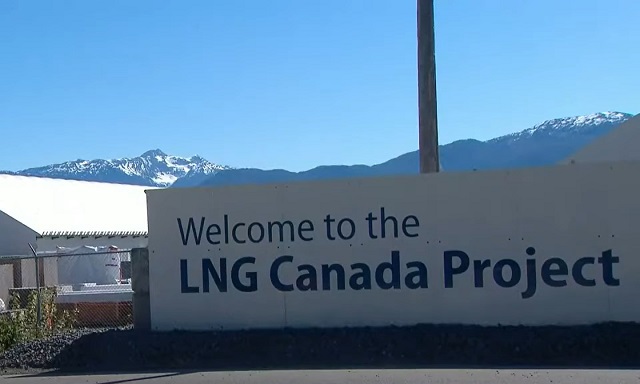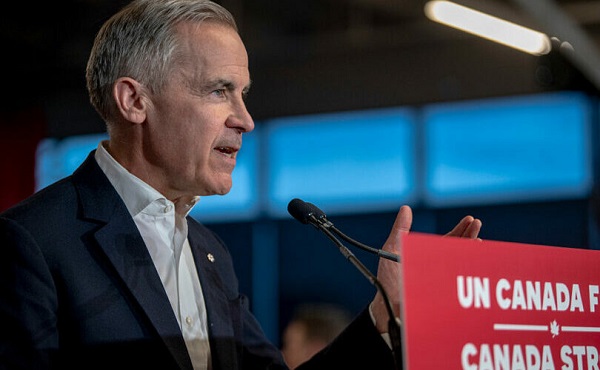Energy
Canada’s Climate Fetish Could Decimate Key Industry For First Nations

 From the Daily Caller News Foundation
From the Daily Caller News Foundation
Obsessed with the faux climate crisis, the Canadian government in Ottawa seemingly discounts altogether the social and economic benefits of natural gas to First Nations communities of the country’s western region.
Approximately 5% of the world’s gas comes from Canada, mainly from the vast Western Canadian Sedimentary Basin underlying several provinces, including British Columbia, Alberta and Saskatchewan. In 2023, the country ranked fifth in global production behind the U.S., Russia, Iran and China.
Some First Nations communities — a designation that takes in indigenous people living south of the Arctic Circlehave — historically faced challenges in terms of economic development and social well-being. Limited access to education, healthcare and infrastructure has resulted in lower living standards compared to the national averagea — fact that I observed firsthand as a researcher in British Columbia. Unemployment rates are often higher in First Nations communities, and poverty remains a persistent issue.
However, oil and gas development has provided a pathway to prosperity for many of these communities. Liquified natural gas (LNG) projects, for example, require a significant workforce in both construction and operational phases. This translates into direct employment opportunities and much needed income for First Nations people otherwise lacking financial security.
The development of natural gas resources also necessitates infrastructure upgrades in nearby communities. These can include the construction or enhancements of roads, bridges and communication networks. Such improvements benefit the entire community by providing access to markets, educational opportunities and other essential services.
“For far too long, First Nations could only watch as others built generational wealth from the resources of our traditional lands” says Eva Clayton, president of the Nisga’a Lisims government. “But times are changing.”
First Nations participation in natural gas development goes beyond economic benefits. It represents an opportunity for communities to assert their self-determination and participate in shaping their own future. Communities can participate in natural gas projects through equity ownership and various arrangements, including Impact Benefit Agreements. According to the Canada Energy Centre, more than 75 First Nations and Métis communities in Alberta and British Columbia have agreed to ownership stakes in energy projects, including the Coastal GasLink pipeline and major transportation networks for oil sands production.
One such example is the recent Musqueam Partnership agreement by FortisBC, which will share the benefits of the Tilbury LNG facility’s expansion phase to begin in 2025. First Nations beneficiaries will include communities of the Snuneymuxw, T’Sou-ke, Esquimalt, Scia’new, Pacheedaht, Pauquachin, Huu-ay-aht, Kyuquot/Checleseht, Toquaht, Uchucklesaht and Ucluelet. Similarly, the Woodfibre LNG project to begin production in 2027 will directly benefit the Squamish community.
DemandObsessed with the faux climate crisis, the Canadian government in Ottawa seemingly discounts altogether the social and economic benefits of natural gas to First Nations communities for natural gas in North America and across the world should ensure increasing prosperity into the future, unless the federal government’s climate fetish undermines the industry.
Just such a possibility has prompted an alarm to be sounded by the First Nations LNG Alliance—a collective of communities supportive of LNG development in British Columbia.
“First Nations have made their choice about the LNG opportunity, informed by research and consultation,” says Karen Ogen, CEO of the LNG Alliance.
“However, when 88 environmental groups and other organizations recently demanded an end to LNG, no one bothered to talk to us,” she said. “I view that as a ‘re-colonization’ of energy by environmentalists. It’s a type of eco-colonialism that First Nations people like me are all-too familiar with, particularly as we seek to diversify our economies and provide opportunities for young people and future generations.”
Ms. Ogen’s complaint of “eco-colonialism” is not unlike the charge of “climate imperialism” that has been leveled against Western elites by leaders of the Global South who bristle at being pressured to adopt “green” agendas at the expense of actual economic development supported gas and other fossil fuels.
Indeed, the sentiments of Ms. Ogen almost certainly resonate with those who favor common sense over ideology. “Canadian LNG is Indigenous LNG, and that is good for the world and good for all of us here,” she says.
Vijay Jayaraj is a Research Associate at the CO2 Coalition, Arlington, Virginia. He holds a master’s degree in environmental sciences from the University of East Anglia, U.K.
Daily Caller
AI Needs Natural Gas To Survive


From the Daily Caller News Foundation
By David Blackmon
As recent studies project a big rise in power generation demand from the big datacenters that are proliferating around the United States, the big question continues to focus in on what forms of generation will rise to meet the new demand. Most datacenters have plans to initially interconnect into local power grids, but the sheer magnitude of their energy needs threatens to outstrip the ability of grid managers to expand supply fast enough.
This hunger for more affordable, 24/7 baseload capacity is leading to a variety of proposed solutions, including President Donald Trump’s new executive orders focused on reviving the nation’s coal industry, scheduled to be signed Tuesday afternoon. But efforts to restart the permitting of new coal-fired power plants in the US will require additional policy changes, efforts which will take time and could ultimately fail. In the meantime, datacenter developers find themselves having to delay construction and completion dates until firm power supply can be secured.
Datacenters specific to AI technology require ever-increasing power loads. For instance, a single AI query can consume nearly ten times the power of a traditional internet search, and projections suggest that U.S. data center electricity consumption could double or even triple by 2030, rising from about 4-5% of total U.S. electricity today to as much as 9-12%. Globally, data centers could see usage climb from around 536 terawatt-hours (TWh) in 2025 to over 1,000 TWh by 2030. In January, a report from the American Security Project estimated that datacenters could consume about 12% of all U.S. power supply.
Obviously, the situation calls for innovative solutions. A pair of big players in the natural gas industry, Liberty Energy and Range Resources, announced on April 8 plans to diversify into the power generation business with the development of a major new natural gas power plant to be located in the Pittsburgh area. Partnering with Imperial Land Corporation (ILC), Liberty and Range will locate the major power generation plant in the Fort Cherry Development District, a Class A industrial park being developed by ILC.
“The strategic collaboration between Liberty, ILC, and Range will focus on a dedicated power generation facility tailored to meet the energy demands of data centers, industrial facilities, and other high-energy-use businesses in Pennsylvania,” the companies said in a joint release.
Plans for this new natural gas power project follows closely on the heels of the March 22 announcement for plans to transform the largest coal-fired power plant in Pennsylvania, the Homer City generating station, into a new gas-fired facility. The planned revitalized plant would house 7 natural gas turbines with a combined capacity of 4.5 GW, enough power 3 million homes.
Both the Homer City station and the Fort Cherry plant will use gas produced out of the Appalachia region’s massive Marcellus Shale formation, the most prolific gas basin in North America. But plans like these by gas companies to invest in their own products for power needs aren’t isolated to Pennsylvania.
In late January, big Permian Basin oil and gas producer Diamondback Energy told investors that it is seeking equity partners to develop a major gas-fired plan on its own acreage in the region. The facility would primarily supply electricity to data centers, which are expected to proliferate in Texas due to the AI boom, while also providing power for Diamondback’s own field operations. This dual-purpose approach could lower the company’s power costs and create a new revenue stream by selling excess electricity.
Prospects for expansion of gas generation in the U.S. received a big boost in January when GE Vernova announced plans for a $600 million expansion of its manufacturing capacity for gas turbines and other products in the U.S. GE Vernova is the main supplier of turbines for U.S. power generation needs. The company plans to build 37 gas power turbines in 2025, with a potential increase to over 70 by 2027, to meet rising energy demands.
The bottom line on these and other recent events is this: Natural gas is quickly becoming the power generation fuel of choice to feed the needs of the expanding datacenter industry through 2035, and potentially beyond. Given that reality, the smart thing to do for these and other companies in the natural gas business is to put down big bets on themselves.
David Blackmon is an energy writer and consultant based in Texas. He spent 40 years in the oil and gas business, where he specialized in public policy and communications.
Bjorn Lomborg
The stupidity of Net Zero | Bjorn Lomborg on how climate alarmism leads to economic crisis

From spiked on YouTube
Note: This interview is focused on Europe and the UK. It very much applies to Canada. The 2025 Federal Election which will see Canadians choose between a more common sense approach, and spending the next 4 years continuing down the path of pursuing “The Stupidity of Net Zero”.
European industry is in freefall, and Net Zero is to blame.
Here, climate economist Bjorn Lomborg – author of Best Things First and False Alarm – explains how panic over climate change is doing far more damage than climate change itself. Swapping cheap and dependable fossil fuels for unreliable and expensive renewables costs our economies trillions, but for little environmental gain, Lomborg says.
Plus, he tackles the myth of the ‘climate apocalypse’ and explains why there are more polar bears than ever.
Support spiked: https://www.spiked-online.com/support/
Sign up to spiked’s newsletters: https://www.spiked-online.com/newslet…
-

 2025 Federal Election1 day ago
2025 Federal Election1 day agoRCMP memo warns of Chinese interference on Canadian university campuses to affect election
-

 2025 Federal Election1 day ago
2025 Federal Election1 day agoResearchers Link China’s Intelligence and Elite Influence Arms to B.C. Government, Liberal Party, and Trudeau-Appointed Senator
-

 MAiD2 days ago
MAiD2 days agoDisability rights panel calls out Canada, US states pushing euthanasia on sick patients
-

 Justice2 days ago
Justice2 days agoCanadian government sued for forcing women to share spaces with ‘transgender’ male prisoners
-

 Alberta2 days ago
Alberta2 days agoAlberta takes big step towards shorter wait times and higher quality health care
-

 Energy2 days ago
Energy2 days agoTrump signs four executive orders promoting coal industry
-

 COVID-1922 hours ago
COVID-1922 hours agoFauci, top COVID officials have criminal referral requests filed against them in 7 states
-

 2025 Federal Election22 hours ago
2025 Federal Election22 hours agoMark Carney vows to provide sterilizing puberty blockers to children ‘without exception’









